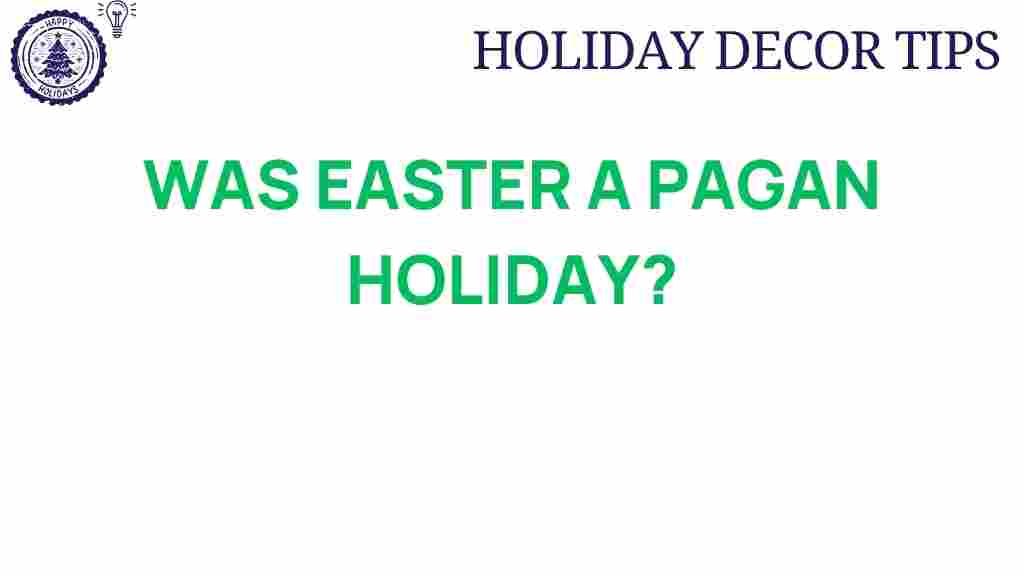Easter: Unraveling the Mystery of Its Pagan Origins
Easter is a widely celebrated holiday that marks the resurrection of Jesus Christ, a cornerstone of Christian faith. However, some scholars and enthusiasts have long debated whether Easter has roots in ancient pagan traditions. This article explores the intriguing history of Easter, its potential pagan connections, and how these elements have interwoven over the centuries.
The Historical Background of Easter
To understand whether Easter was originally a pagan holiday, it’s essential to delve into its historical context. Easter is celebrated on the first Sunday following the first full moon after the vernal equinox, a method of timing that has its origins in the Jewish calendar and the timing of Passover.
- Early Christianity: The resurrection of Jesus became a significant event for early Christians, leading to the establishment of Easter as a religious holiday.
- Jewish Influence: The timing of Easter is closely tied to the Jewish Passover, which celebrates the liberation of the Israelites from Egypt.
- Council of Nicaea: In 325 AD, this council formalized the date of Easter, further intertwining Christian celebrations with existing cultural observances.
Exploring Pagan Connections
Many argue that Easter’s timing and some customs may have been influenced by pre-Christian pagan festivals. Two significant pagan traditions often cited in relation to Easter are:
- Spring Equinox Celebrations: Many ancient cultures celebrated the arrival of spring, symbolizing rebirth and renewal. This aligns with the themes of resurrection found in Easter.
- Ishtar and Eostre: The goddess Ishtar was worshipped in ancient Babylon, while Eostre was a goddess of spring and fertility in Anglo-Saxon paganism. The name “Easter” is believed to derive from Eostre.
The Symbolism of Easter Customs
Several customs associated with Easter appear to have pagan origins. Understanding these symbols can help unravel the mystery of Easter’s true nature:
- Eggs: The egg is a potent symbol of fertility and new life, often associated with pagan spring festivals.
- Rabbits: The Easter Bunny, a popular figure in modern celebrations, is thought to have originated from pagan fertility symbols.
- Bonfires: Light and fire, significant in many pagan traditions, symbolize purification and renewal.
How Easter Evolved Over Time
Over the centuries, Easter has evolved, absorbing various cultural elements along the way. This evolution can be broken down into distinct phases:
1. Early Christian Adaptation
As Christianity spread, existing pagan customs were often adapted to fit the new faith. This adaptation helped facilitate the conversion of pagan populations.
2. The Middle Ages
During the Middle Ages, many pagan traditions were incorporated into Easter celebrations, including feasting, games, and communal gatherings.
3. Modern Celebrations
Today, Easter is celebrated worldwide, often blending religious observance with cultural traditions. The holiday has become a time for family gatherings, egg hunts, and festive meals.
Step-by-Step Process: How to Celebrate Easter Today
Wondering how to celebrate Easter in a way that honors both its Christian and potential pagan roots? Here’s a step-by-step guide:
- Plan Your Celebration: Decide whether you’ll focus on religious observances, cultural traditions, or a blend of both.
- Decorate with Symbols: Use eggs, flowers, and spring-themed decorations to represent renewal and life.
- Prepare a Feast: Create a meal that features traditional Easter foods like lamb, eggs, and seasonal vegetables.
- Organize an Egg Hunt: This fun activity can be enjoyed by families, blending the joy of spring with Easter traditions.
- Attend a Service: If you’re inclined, attend a church service to commemorate the resurrection.
Troubleshooting Tips for Easter Celebrations
As with any holiday, things may not always go as planned. Here are some troubleshooting tips to ensure a smooth celebration:
- Weather Issues: If you planned an outdoor celebration, have an indoor backup ready, like games or crafts.
- Dietary Restrictions: Consider the dietary needs of your guests when planning the menu to ensure everyone can enjoy the feast.
- Engagement: If some guests seem disinterested, involve them in activities like egg decorating or storytelling to enhance engagement.
Conclusion: Embracing Easter’s Rich Tapestry
The question of whether Easter was originally a pagan holiday is complex, reflecting the rich tapestry of cultural and religious traditions that have shaped it over time. While Easter undoubtedly has roots in Christianity, its customs and symbols are intertwined with ancient pagan practices celebrating renewal and spring.
Ultimately, whether you celebrate Easter as a religious observance, a cultural festivity, or a blend of both, the essence of the holiday lies in the themes of hope, renewal, and community. So, as you gather with loved ones this Easter, take a moment to appreciate the diverse history that has led to this vibrant celebration.
For more insights on holiday traditions, check out this informative article. If you’re interested in the historical context of Easter, visit this external resource for further reading.
This article is in the category Themes and created by HolidayDecorTips Team
